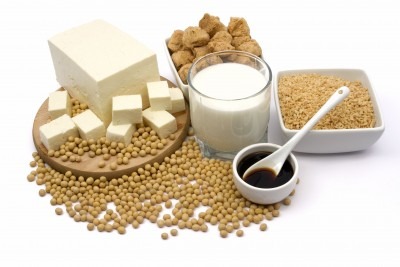
Some byproducts of soy beans. Selecting the right variety for the specific market enhances selling of the crop harvest. Photo by Africa Do Business.
Farmers planting the right variety of soy beans in respect to market demand easily hack the undying demand for the commodity before the seeds expire.
Dry soy beans expire six months after harvesting. Despite being one of the most sought after crop for its rich oil or proteins, farmers are shying away from cultivating it as a result of the losses they incur when they miss the consumer before expiry.
Speaking on the sidelines of the Food Trade East and Southern Africa (FTESA) regional grantees meeting in Nairobi, Classic foods Ltd Chief Executive Officer Wachira Kariuki said the market is ‘hungry’, but the farmers are delivering the wrong output.
Soy beans are classified based on oil or oil or protein content.
“Companies are looking for soy beans for extraction of cooking oil. Millers are also looking for protein-rich soy beans for fortification of cooking and baking flour. If the farmer does not have the required variety with the ingredient being looked for, the processor will turn them back,” the CEO said.
If the farmers store the beans past six months, they are rejected, a fact that make them lose interest in the crop, which is on demand all-year round.
Depending on the supply, a 90kg bag costs Sh5,400 to Sh9,000in Kenya.
Bidco Africa is one of the companies that have consistently announced they need soy beans for cooking oil.
It is required by law that maize flour millers in Kenya enrich their products with other nutrients to this staple food.
READ ALSO: Bidco desperately looking for farmers to grow sunflower and soya beans
READ ALSO: Farmers milk fortunes adding value to soyabeans
READ ALSO: Mumias farmers replace cane with soya beans
The 25 per cent protein added to the flour is from milled soy beans. Other minerals like iron, zinc, among others are got from amaranth seeds among other sources.
Soy seeds that have stayed for more than six months have a germination rate of less than 10 per cent.
In helping the farmers overcome these challenges, Classic Foods LTD works with input companies to deliver seeds that have not expired.
The soy flour processor also trains farmers on how to get the best yields besides offering them the market.
Although the company processes flour, it also buys the oil-rich soy beans, which it delivers to other processors like Bidco to lessen the burden of searching for the market to the farmer.
“The Classic Foods experts help farmers get the best output per acre with minimum expenditure. Prompt payment is made to enable the farmers start the next production cycle smoothly,” Kariuki said.
The company is working with at least 17,000 farmers in Kenya and Uganda. They are in groups under other lead farmers. It also runs regional demonstration farms.
Because most farmers in Kenya cannot abandon maize for any other crops, they are guided to come up with a rotation timetable, which will ensure the beans enrich the soil with nitrogen.
Besides, the farmers are trained on value addition. Several groups are including a certain percentage of soy beans flour in baking to come up with products such as cakes, cookies, chapatis, doughnuts, among others.
Classic Foods Ltd is one of the grantees of the FTESA trade enhancement and promotion programme focusing on staple food value chains.
The programme is funded by the UKaid to support the private sector and other institutions to improve storage, input service markets, information and coordination and influence policy to enhance trade in the region.
The five-year trade enhancement programme has impacted more than 1.3 million people in Kenya, Zimbabwe, Zambia, Tanzania, Rwanda, Burundi, Uganda, Malawi and Mozambique.
















Comments powered by CComment